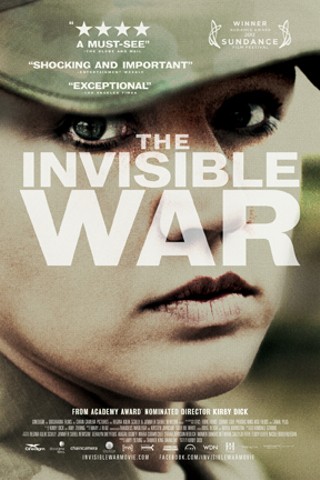Kori Cioca recalls going through letters and postcards she received from her family during her time in the United States Coast Guard. Buried among them was the suicide note she never left.
Kori was a victim of sexual harassment and then sexual abuse from a superior officer. One night late in 2005, her attacker broke her jaw before raping her. He was docked some pay and was sentenced to what amounted to a 30-day probation; Cioca was threatened with a court martial if she continued to pursue action, can't get Veterans Affairs to pay for surgery to repair her jaw, battles post-traumatic stress disorder, and deals with constant physical and emotional pain.
The Invisible War draws out several cases like that of Kori, from women and one man raped and assaulted by their fellow soldiers. The statistics are almost impossible to believe: Last year, more than 3,000 cases were reported, but the Department of Defense estimates that most victims stay silent, so the real number is north of 15,000 every year.
Since the film is being released now, it has a chance to open more eyes in the wake of the Penn State sexual-abuse scandal. The specifics are different, but one thing the two cases have in common is institutional indifference. For decades, the Department of Defense has claimed a zero-tolerance policy on sexual harassment, sexual abuse and rape. Remember the Navy Tailhook scandal? That was more than 20 years ago. In one four-day stretch, 90 officers (83 of them women) were sexually assaulted at a convention in Las Vegas.
Then there were the incidents in 1996, at the Aberdeen Proving Ground in Maryland. In all, 12 male Army officers were charged. Zero-tolerance policy. At the Air Force Academy in Colorado Springs, 12 percent of the female cadets of the class of 2003 claimed they had been raped, while 70 percent—more than 400 women—claimed they had been harassed. And there was a zero-tolerance policy.
The message of The Invisible War is not that rapes happen in the military, but that the institution stonewalls every major effort to change the culture, and even downplays the seriousness of what a rape is and what it does to the victim. Again, while the context is different, the average rational person can't read the Freeh Report on the Penn State scandal and understand how the greater good in that situation was a football coach and not helpless kids. How can the Catholic Church play a shell game with priests and move them around the country instead of protecting children? It's much the same here: How is the greater good protecting a senior officer? How is that possible?
Director Kirby Dick—a native Tucsonan who will be at the Loft this weekend—doesn't act as though the answer is right in front of his face; he is probably as shocked as we are. Congress knows; DOD knows; the courts know. Oh, do the courts know: Cioca et al. v. Rumsfeld et al. was dismissed in federal court last year, citing that sexual assault was "incident to service," and holding with precedent that military cases should be handled within the military, unbound by the U.S. judicial system. And so the epidemic rolls on.
If you haven't guessed as much by now, The Invisible War is a thoroughly troubling motion picture. There are a couple of uncomfortable laughs in this documentary courtesy of a boneheaded media campaign rolled out by the DOD several years ago. It includes public-service announcements with not-very-catchy rap songs, training videos and posters designed to let soldiers know that sexual assault is not OK. But in a culture where the victim is so often blamed for the attacks, the videos actually say, "Ask her when she's sober." That's how disconnected from reality the Department of Defense is.
Kirby Dick does not make easy documentaries. Twist of Faith dealt with sexual abuse in the Catholic Church; Outrage opened the closet door on gay legislators pushing for anti-gay legislation; and This Film Is Not Yet Rated explored the power-brokers at the Motion Picture Association of America. So he's been down this road of poisoned institutions before.
Meeting these victims, all with similarly heartbreaking stories, cuts you square in half emotionally. On one side, there's the anger you feel at your own military for not being able to protect its own women and men from each other, before or after the fact. On the other, you feel so greatly indebted to them for going public about such humiliation and pain.











